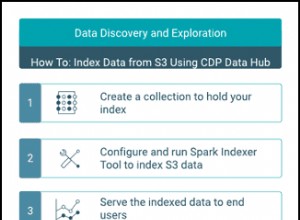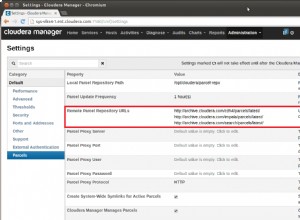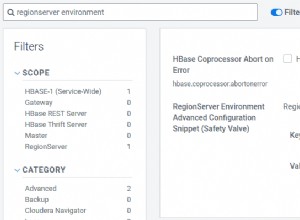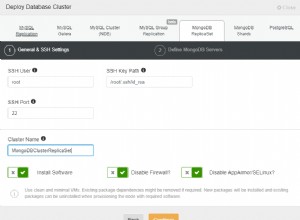Jeśli używasz aktualnej wersji Spring Data, która obsługuje $cond operator za pośrednictwem $project potok, to można to przekonwertować na (nietestowane):
import static org.springframework.data.mongodb.core.aggregation.Aggregation.*;
import static org.springframework.data.mongodb.core.aggregation.ConditionalOperators.Cond.*;
import org.springframework.data.mongodb.core.query.Criteria;
Cond condOperation = ConditionalOperators.when(Criteria.where("start").is("EARLY"))
.thenValueOf("deltastart.start")
.otherwise("deltastart.end");
Aggregation agg = newAggregation(project().and(condOperation).as("start"));
AggregationResults<MyClass> results = mongoTemplate.aggregate(agg, MyClass.class);
List<MyClass> myList = results.getMappedResults();
Dla wersji Spring-Data MongoDB, która nie obsługuje $cond operatora w operacji agregacji, istnieje obejście polegające na zaimplementowaniu AggregationOperation interfejs do przyjęcia DBObject:
public class CustomProjectAggregationOperation implements AggregationOperation {
private DBObject operation;
public CustomProjectAggregationOperation (DBObject operation) {
this.operation = operation;
}
@Override
public DBObject toDBObject(AggregationOperationContext context) {
return context.getMappedObject(operation);
}
}
Następnie zaimplementuj $project operacja jako DBObject w potoku agregacji, który jest taki sam jak ten, który masz:
DBObject operation = (DBObject) new BasicDBObject(
"$project", new BasicDBObject(
"start", new BasicDBObject(
"$cond", new Object[]{
new BasicDBObject(
"$eq", new Object[]{ "$start", "EARLY"}
),
"$deltastart.start",
"$deltastart.end"
}
)
)
);
których możesz następnie użyć w TypeAggregation:
TypedAggregation<CustomClass> aggregation = newAggregation(CustomClass.class,
new CustomProjectAggregationOperation(operation)
);
AggregationResults<CustomClass> result = mongoTemplate.aggregate(aggregation, CustomClass.class);




